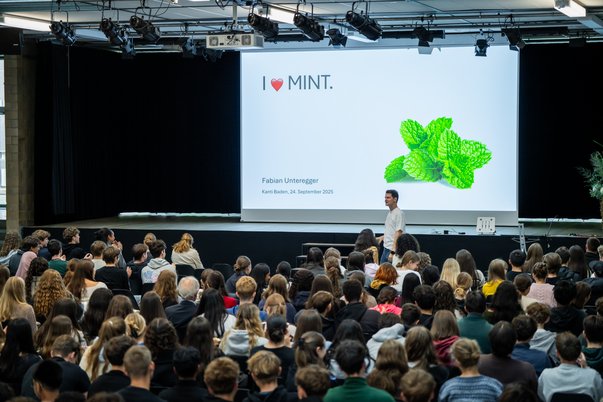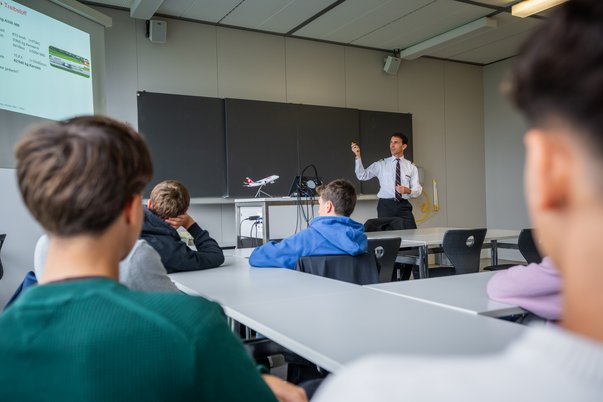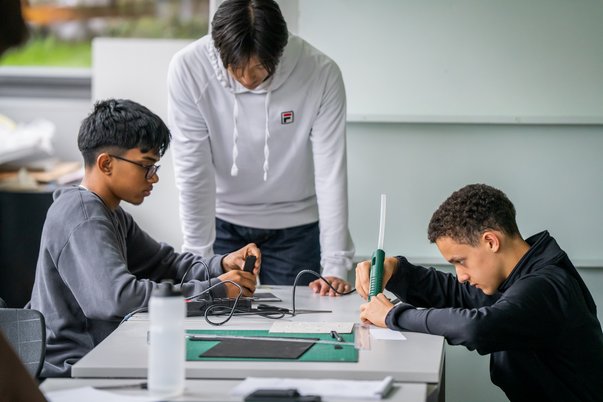
Traduit avec DeepL
Imaginez que vous puissiez vous glisser, le temps d'une journée, dans la peau d'un expert en cybersécurité chargé de contrer les attaques de pirates informatiques. Ou vous pourriez plonger dans les profondeurs des océans avec une biologiste marine, programmer des robots avec des ingénieurs de Google ou apprendre d'une ingénieure en aéronautique ce que c'est que de développer des technologies spatiales. Ce qui semble être un séminaire exécutif coûteux était mercredi le quotidien de l'école cantonale de Baden. Voilà à quoi ressemble l'éducation si elle veut vraiment captiver les jeunes. Quelque 1200 élèves ont eu un avant-goût de leur avenir possible lors de la journée MINT. Et certainement aussi la pensée : "C'est ce que je veux faire moi aussi" !
"Nous souhaitons sensibiliser nos élèves aux thèmes MINT et les relier à des sujets qu'ils ne rencontrent pas au quotidien à l'école. Ceux-ci doivent renforcer leur conscience et les inciter à faire les choses par eux-mêmes. La collaboration avec la SATW est très encourageante à cet égard", explique la vice-rectrice Irmgard Bühler à propos de l'idée derrière cette journée.
Dans l'aula, qui accueille le plus grand nombre d'élèves, la biologiste marine Silvia Frey de KYMA sea conservation & research s'est exprimée et a montré les conséquences dramatiques de la pêche industrielle sur nos mers. Le deuxième orateur de l'aula, Fabian Unteregger, a fait davantage rire. Ce comédien et médecin a fait sourire le public avec des anecdotes pleines d'humour tout en donnant des conseils pratiques pour la vie professionnelle.

La diversité des offres a montré toute la gamme de ce que la science et la technique modernes peuvent offrir : Lors du Live Hacking de la ZHAW School of Engineering, les jeunes ont pu découvrir la cybersécurité dans la pratique. Au même étage du vaste site de la Kanti Baden, Valentin Schlattinger, ingénieur en logiciels chez Google à Zurich, a expliqué aux élèves comment construire leur propre robot. L'élève Isabella déclare : "Cela fait longtemps que le thème de la robotique m'intéresse, mais jusqu'à présent, je n'avais que des connaissances théoriques. Maintenant, je peux les mettre en pratique".
Les ateliers au cours desquels les élèves ont pu mettre la main à la pâte ont été très appréciés : "La médecine à fleur de peau" a donné un aperçu réaliste du métier de médecin, tandis que Johnson & Johnson MedTech a montré aux jeunes qu'une fracture signifie bien plus qu'un simple plâtre. Fabrizio Fischetti de la HSLU a donné à un groupe d'élèves un premier aperçu de la manière dont ils peuvent prendre le pouls ou se faire des bandages. "Il y a toujours un énorme besoin de personnel soignant, c'est pourquoi il est bon de lutter contre la pénurie de personnel qualifié dès l'école", a déclaré Fischetti.
Dans un autre atelier, l'élève Amélie a suivi avec attention les deux ingénieurs d'ABB qui ont fait découvrir aux participants le monde des robots industriels. "J'avais choisi ce thème parce qu'il avait l'air passionnant", a-t-elle déclaré. Le décor était tout différent avec le pilote de Swiss Jeff Lüscher : vêtu de son uniforme de pilote, il a présenté à ses auditeurs à quoi ressemble réellement le métier de pilote, quelles sont les connaissances nécessaires et quels sont les programmes de formation déjà disponibles pour les jeunes.
Ce qui a également rendu ce mercredi particulier, c'est que la liste des organisations participantes se lit comme le "Who's Who" du paysage suisse de la recherche et de l'industrie. Des géants de la technologie comme Google, des groupes suisses comme ABB et Axpo, mais aussi des hautes écoles renommées comme l'ETH Zurich ou l'EPFL. L'offre externe a été complétée par 21 ateliers organisés par les propres enseignants de l'école cantonale de Baden. C'est avec enthousiasme qu'ils ont transmis leurs connaissances au-delà des matières scolaires obligatoires, de la physique quantique aux cryptomonnaies en passant par des expériences pratiques en laboratoire.

Une telle journée dans une école est coûteuse en termes d'organisation, mais elle en vaut la peine pour le choix des études et de la profession ainsi que pour la promotion de l'intérêt et de la compréhension des thèmes MINT. Et ce n'est pas un événement unique. Depuis 2007, la SATW organise des TecDays dans les gymnases suisses avec des résultats mesurables, et depuis de nombreuses années, l'école cantonale de Baden organise régulièrement des journées MINT. Une étude récente du KOF montre que les élèves qui ont participé à un TecDay sont plus susceptibles de choisir des études MINT. Et les propres enquêtes de la SATW montrent que le TecDay est utile pour le choix des matières et des études et qu'il montre aux élèves comment et où les connaissances théoriques peuvent être appliquées au-delà de la matière scolaire.
Outre les ateliers, la journée proposait un programme ludique dans le cadre duquel les élèves pouvaient résoudre des énigmes pendant les pauses. L'après-midi, de nombreux élèves se sont retrouvés dans l'aula pour une dernière conférence : l'ingénieure en aérospatiale Chloé Carrière les a emmenés en voyage dans l'espace, et ce en anglais, car la science ne connaît pas de frontières linguistiques. De la technologie des fusées aux missions sur Mars : Carrière a prouvé que même les techniques spatiales les plus complexes peuvent être expliquées de manière compréhensible et vivante.
